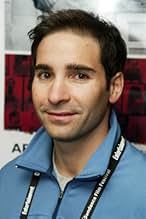A gripping, emotionally charged film that follows wrongfully convicted men freed by DNA evidence after decades in prison as they struggle to transition back into society.A gripping, emotionally charged film that follows wrongfully convicted men freed by DNA evidence after decades in prison as they struggle to transition back into society.A gripping, emotionally charged film that follows wrongfully convicted men freed by DNA evidence after decades in prison as they struggle to transition back into society.
- Awards
- 3 wins & 2 nominations total
- Director
- Writers
- All cast & crew
- Production, box office & more at IMDbPro
Featured reviews
I knew from reading and research that the criminal justice system was deeply flawed on many levels. This movie beautifully and powerfully illustrates all that is wrong with our system. Men are incorrectly identified by witnesses; even after being excluded as the perpetrator by DNA wrongfully convicted individuals sit in jail as part of a show of force by the DA. Once released, some still have criminal records and find it difficult to get jobs. Some have difficulty acclimating to life outside of a cage. They have no skills. They have no money. They are broken. They are angry, and you will be too after watching this. Wilton Dedge's broken spirit will stick with you. Fortunately, he received 2 million dollars for 22 years in prison.
10sleacc
I just saw After Innocence at the Get Real Film Festival in Minneapolis. I too was aware of the Innocence Project - but now I am So Much more informed in regard to this important issue. I hope this film is seen widely as there are important issues needing attention...the after innocence issues. For instance, it's important that an innocent person who is exonerated receive compensation for their time. As it is they receive nothing upon release. How much is 5-10-20 years of a life worth? How does a family recoup money spent to fight for the truth? How does one rejoin society after years of imprisonment? An exonerated person also needs to have their record expunged. Altho they have their exoneration certificate, their record of jail time is still there. An exonerated person may receive no assistance with employment, no assistance with reintroduction into society upon release. I believe this is unlike the guilty, who after serving their time, receive medical coverage, monetary benefits and assistance with employment.
It was so nice and so moving to meet Wilton Dedge in person after the film. For me to fully appreciate the impact of serving 20 plus years for a crime not committed is impossible. But as Wilton commented after the film, it is very important to be aware of this issue and involved -- as this could happen to anyone.
It was so nice and so moving to meet Wilton Dedge in person after the film. For me to fully appreciate the impact of serving 20 plus years for a crime not committed is impossible. But as Wilton commented after the film, it is very important to be aware of this issue and involved -- as this could happen to anyone.
10witham-4
I couldn't sleep, so was watching early morning TV. This film killed sleep that night.I was crying, with anger, empathy ...and remorse, because I have never done anything to highlight such miscarriages of justice.
The prosecutor in Mr Dregde's case - who could not admit he got it wrong, and made him spend 3 more years in jail. A seriously stupid and blinkered man.
The lack of conscience of the state and prosecutors - who did not expunge the records, and left these people with a tragic life on the outside, worse than if they had been guilty.
The one prosecutor who apologised is a man of honour.
Governor Ryan is a very brave man, and one of conscience - would we had more in Government! May I recommend John Grisham's book, The Innocent Man, For another tale of criminally inadequate judiciary - I don't even like him as a writer, but I was given this book, and slept less because of it.
How many people rot in jail because of incompetent prosecutors and lazy investigators? Thank God for DNA - as the film said - "God's Fingerprint".
I have never written to a website before - I don't like giving details for Spam senders - but this film has made me so ANGRY!!! Can anyone support the death penalty having seen such spectacular miscarriages of justice? The people not shown,on death row,whose evidence has been "lost".
The lack of expungement, and thus hurdles in getting a job.
The FEE to get an expungement in some states - take my life and then charge me to get it back? Compensation for lost earnings, and for monies spent on defence, should be automatic for all exonerees - in most cases, they have lost the best years of their life, and their chance to establish themselves financially, through the incompetence of the justice system. The lawyers from the Innocence Project got it right - this should be a clarion call to all of us, to reform the system.
Thank you to the filmmakers for such a coherent and impressive film - and to those who helped finance it. It should be shown weekly on national TV.
0
The prosecutor in Mr Dregde's case - who could not admit he got it wrong, and made him spend 3 more years in jail. A seriously stupid and blinkered man.
The lack of conscience of the state and prosecutors - who did not expunge the records, and left these people with a tragic life on the outside, worse than if they had been guilty.
The one prosecutor who apologised is a man of honour.
Governor Ryan is a very brave man, and one of conscience - would we had more in Government! May I recommend John Grisham's book, The Innocent Man, For another tale of criminally inadequate judiciary - I don't even like him as a writer, but I was given this book, and slept less because of it.
How many people rot in jail because of incompetent prosecutors and lazy investigators? Thank God for DNA - as the film said - "God's Fingerprint".
I have never written to a website before - I don't like giving details for Spam senders - but this film has made me so ANGRY!!! Can anyone support the death penalty having seen such spectacular miscarriages of justice? The people not shown,on death row,whose evidence has been "lost".
The lack of expungement, and thus hurdles in getting a job.
The FEE to get an expungement in some states - take my life and then charge me to get it back? Compensation for lost earnings, and for monies spent on defence, should be automatic for all exonerees - in most cases, they have lost the best years of their life, and their chance to establish themselves financially, through the incompetence of the justice system. The lawyers from the Innocence Project got it right - this should be a clarion call to all of us, to reform the system.
Thank you to the filmmakers for such a coherent and impressive film - and to those who helped finance it. It should be shown weekly on national TV.
0
Documentary about men who had been incarcerated, some for 20 years or more, awaiting certain execution on death row, who subsequently have been exonerated after their convictions for capital crimes were overturned as a result of new, DNA-based evidence proving their innocence.
These conviction reversals are, almost without exception, the result of pro bono legal assistance provided by the Innocence Project, a non-profit legal clinic established in 1992 at the Benjamin N. Cardozo School of Law in New York City.
The two founders of the clinic, Barry Scheck and Peter Neufeld, have waged a relentless battle to aid wrongly convicted men facing execution, in the process encouraging the development of similar clinics in 30 states. To date, 175 persons have been exonerated through these efforts.
Former Illinois Governor George Ryan was so impressed by the likelihood of error in capital convictions that, shortly before leaving office early in 2003, he commuted the death sentences of all convicts awaiting execution in his state.
This film focuses on several affected men, exploring the events and circumstances that followed the demonstration of their innocence. Exoneration brings no assistance to these men. For example, even the expungement of the conviction from the criminal justice record is not automatic. It must be applied for through a convoluted paper process. In one state, the exonerated individual must pay $6,000 in fees to gain an expungement.
Whereas guilty felons placed on parole may be entitled to many services and sources of aid for things like education, employment and heath care, exonerated persons receive no such entitlements. No state has arranged a program to offer compensation to any of these people. In nearly every instance, they don't even get an apology from the State for erroneously taking away their freedom for years upon years.
We also are reminded of bad things we already knew from other films, namely, that prosecutors and judges are often loath to accept the DNA evidence, insisting, if you can believe this, that because a case was tried fairly, i.e., the trial met acceptable prosecutorial and judicial standards, the convict should continue to be incarcerated and even executed, despite proof of innocence!
In one man's case that we follow throughout this film, prosecutors stalled for three years after DNA testing had proved that he was not the perpetrator, during which time the man remained in prison, before Innocence Project lawyers prevailed in bringing the DNA evidence to court and winning an acquittal. Interviewed for the film, one member of that prosecuting team justified the effort to keep the convict on death row on the basis that "the victim's family needs closure."
Not every case reveals such perversely twisted sentiments. In a heartwarming example of the opposite reaction, we see a prosecutor embrace another newly released, exonerated man, apologizing for the hardship caused by his false conviction and incarceration.
We see in this film stories of success and failure after release of these men from prison. One gets a good job from a sympathetic truck repair shop owner. Another successfully pursues his dream of becoming a psychotherapist, first obtaining an A.A. degree, then his B.S. in Psychology. But others fail to find decent work, their records still blemished by unexpunged information regarding their false convictions. One man dies of a heart attack a few years after his release. A successful support group is formed in one locale, and we learn of various efforts now underway to seek compensation, though none has so far succeeded.
Some sobering comments on the problem of false conviction are offered by Barry Scheck and others along the way. The exonerated persons represent the tip of a huge iceberg. The various Innocence Projects around the country receive hundreds and hundreds of requests for aid, far more than they can even answer, much less take on. We are shown files drawers full of unopened envelopes, letters from convicts seeking the help of Scheck and Neufeld's clinic. Scheck says that DNA analysis is possible in only about 10% of the cases they do review. In the other 90% of cases, materials on which DNA analysis can be performed were either absent, were rendered unusable because of botched evidence collection, have been destroyed or lost in the years since the trial.
Scheck also tells us that eyewitness reports constitute the sole evidence base for successful prosecution in 78% of capital crime convictions among persons now on death row. This despite the fact that a huge body of psychological research, conducted by experts like Elizabeth Loftus at the University of Washington (now professor at the University of California, Irvine), has demonstrated the frequent unreliability of such evidence.
One exonerated man's story, followed in this film, has, since his release, brought him into contact with the rape victim who erroneously identified him in a police lineup, the sole basis of his conviction. He and the woman that he did not rape have become friends, and they share a common goal of improving the evidence base relied upon by prosecutors.
This film is extraordinary insofar as its subject - life in the community after exoneration - has not previously been explored in any depth, factual content is lucidly presented, the men featured are articulate, highly interesting individuals (almost all, for example, are remarkably free of hostility about their experiences), the talking heads are informative and kept to an essential minimum, and the photography, editing and continuity are first rate. Jessica Sanders makes her debut here as the (co)writer-director of a feature length documentary. It's a splendid beginning. My grade: 10/10
These conviction reversals are, almost without exception, the result of pro bono legal assistance provided by the Innocence Project, a non-profit legal clinic established in 1992 at the Benjamin N. Cardozo School of Law in New York City.
The two founders of the clinic, Barry Scheck and Peter Neufeld, have waged a relentless battle to aid wrongly convicted men facing execution, in the process encouraging the development of similar clinics in 30 states. To date, 175 persons have been exonerated through these efforts.
Former Illinois Governor George Ryan was so impressed by the likelihood of error in capital convictions that, shortly before leaving office early in 2003, he commuted the death sentences of all convicts awaiting execution in his state.
This film focuses on several affected men, exploring the events and circumstances that followed the demonstration of their innocence. Exoneration brings no assistance to these men. For example, even the expungement of the conviction from the criminal justice record is not automatic. It must be applied for through a convoluted paper process. In one state, the exonerated individual must pay $6,000 in fees to gain an expungement.
Whereas guilty felons placed on parole may be entitled to many services and sources of aid for things like education, employment and heath care, exonerated persons receive no such entitlements. No state has arranged a program to offer compensation to any of these people. In nearly every instance, they don't even get an apology from the State for erroneously taking away their freedom for years upon years.
We also are reminded of bad things we already knew from other films, namely, that prosecutors and judges are often loath to accept the DNA evidence, insisting, if you can believe this, that because a case was tried fairly, i.e., the trial met acceptable prosecutorial and judicial standards, the convict should continue to be incarcerated and even executed, despite proof of innocence!
In one man's case that we follow throughout this film, prosecutors stalled for three years after DNA testing had proved that he was not the perpetrator, during which time the man remained in prison, before Innocence Project lawyers prevailed in bringing the DNA evidence to court and winning an acquittal. Interviewed for the film, one member of that prosecuting team justified the effort to keep the convict on death row on the basis that "the victim's family needs closure."
Not every case reveals such perversely twisted sentiments. In a heartwarming example of the opposite reaction, we see a prosecutor embrace another newly released, exonerated man, apologizing for the hardship caused by his false conviction and incarceration.
We see in this film stories of success and failure after release of these men from prison. One gets a good job from a sympathetic truck repair shop owner. Another successfully pursues his dream of becoming a psychotherapist, first obtaining an A.A. degree, then his B.S. in Psychology. But others fail to find decent work, their records still blemished by unexpunged information regarding their false convictions. One man dies of a heart attack a few years after his release. A successful support group is formed in one locale, and we learn of various efforts now underway to seek compensation, though none has so far succeeded.
Some sobering comments on the problem of false conviction are offered by Barry Scheck and others along the way. The exonerated persons represent the tip of a huge iceberg. The various Innocence Projects around the country receive hundreds and hundreds of requests for aid, far more than they can even answer, much less take on. We are shown files drawers full of unopened envelopes, letters from convicts seeking the help of Scheck and Neufeld's clinic. Scheck says that DNA analysis is possible in only about 10% of the cases they do review. In the other 90% of cases, materials on which DNA analysis can be performed were either absent, were rendered unusable because of botched evidence collection, have been destroyed or lost in the years since the trial.
Scheck also tells us that eyewitness reports constitute the sole evidence base for successful prosecution in 78% of capital crime convictions among persons now on death row. This despite the fact that a huge body of psychological research, conducted by experts like Elizabeth Loftus at the University of Washington (now professor at the University of California, Irvine), has demonstrated the frequent unreliability of such evidence.
One exonerated man's story, followed in this film, has, since his release, brought him into contact with the rape victim who erroneously identified him in a police lineup, the sole basis of his conviction. He and the woman that he did not rape have become friends, and they share a common goal of improving the evidence base relied upon by prosecutors.
This film is extraordinary insofar as its subject - life in the community after exoneration - has not previously been explored in any depth, factual content is lucidly presented, the men featured are articulate, highly interesting individuals (almost all, for example, are remarkably free of hostility about their experiences), the talking heads are informative and kept to an essential minimum, and the photography, editing and continuity are first rate. Jessica Sanders makes her debut here as the (co)writer-director of a feature length documentary. It's a splendid beginning. My grade: 10/10
I saw this documentary last night and after the showing heard the producer as well as two of the men wrongfully imprisoned and featured in the film. The theater was packed and many were obviously moved by the stories of men sent to prison (some for decades) for crimes they were falsely convicted. Thanks to DNA evidence, the truth came out. In most cases these innocent men received no compensation and not even an apology for the times when the system clearly has gone woefully awry. The men were remarkably not bitter but moved to improve criminal justice. I urge all to see this film. I am a simple movie-goer, but this is more than another mere film. It is a clarion call to right some terrible wrongs, and this film skillfully conveys the story.
Did you know
- TriviaShortlisted for Best Documentary Feature at the 2005 Academy Awards.
Details
- Release date
- Country of origin
- Official site
- Language
- Also known as
- Прощай, невинность
- Production companies
- See more company credits at IMDbPro
Box office
- Gross US & Canada
- $114,264
- Opening weekend US & Canada
- $10,194
- Oct 23, 2005
- Gross worldwide
- $114,264
- Runtime1 hour 35 minutes
- Color
- Sound mix
- Aspect ratio
- 1.85 : 1
Contribute to this page
Suggest an edit or add missing content


























